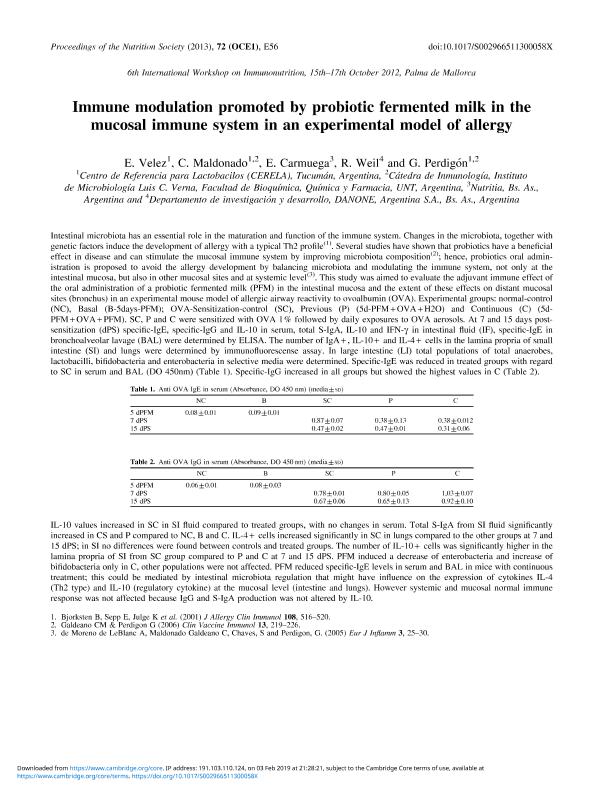Artículo
Immune modulation promoted by probiotic fermented milk in the mucosal immune system in an experimental model of allergy
Velez, Eva Maria del Mar ; Maldonado, Natalia Cecilia
; Maldonado, Natalia Cecilia ; Carmuega, E.; Weil, R.; Perdigon, Gabriela del Valle
; Carmuega, E.; Weil, R.; Perdigon, Gabriela del Valle
 ; Maldonado, Natalia Cecilia
; Maldonado, Natalia Cecilia ; Carmuega, E.; Weil, R.; Perdigon, Gabriela del Valle
; Carmuega, E.; Weil, R.; Perdigon, Gabriela del Valle
Fecha de publicación:
04/2013
Editorial:
Cambridge University Press
Revista:
Proceedings Of The Nutrition Society
ISSN:
0029-6651
Idioma:
Inglés
Tipo de recurso:
Artículo publicado
Clasificación temática:
Resumen
Intestinal microbiota has an essential role in the maturation and function of the immune system. Changes in the microbiota, together withgenetic factors induce the development of allergy with a typical Th2 profile(1). Several studies have shown that probiotics have a beneficialeffect in disease and can stimulate the mucosal immune system by improving microbiota composition(2); hence, probiotics oral admin-istration is proposed to avoid the allergy development by balancing microbiota and modulating the immune system, not only at theintestinal mucosa, but also in other mucosal sites and at systemic level(3). This study was aimed to evaluate the adjuvant immune effect ofthe oral administration of a probiotic fermented milk (PFM) in the intestinal mucosa and the extent of these effects on distant mucosalsites (bronchus) in an experimental mouse model of allergic airway reactivity to ovoalbumin (OVA). Experimental groups: normal-control(NC), Basal (B-5days-PFM); OVA-Sensitization-control (SC), Previous (P) (5d-PFM +OVA +H2O) and Continuous (C) (5d-PFM +OVA +PFM). SC, P and C were sensitized with OVA 1 % followed by daily exposures to OVA aerosols. At 7 and 15 days post-sensitization (dPS) specific-IgE, specific-IgG and IL-10 in serum, total S-IgA, IL-10 and IFN-gin intestinal fluid (IF), specific-IgE inbronchoalveolar lavage (BAL) were determined by ELISA. The number of IgA +, IL-10 +and IL-4 +cells in the lamina propria of smallintestine (SI) and lungs were determined by immunofluorescense assay. In large intestine (LI) total populations of total anaerobes,lactobacilli, bifidobacteria and enterobacteria in selective media were determined. Specific-IgE was reduced in treated groups with regardto SC in serum and BAL (DO 450nm) (Table 1). Specific-IgG increased in all groups but showed the highest values in C (Table 2).Table 1. Anti OVA IgE in serum (Absorbance, DO 450 nm) (media°SD)NC B SC P C5 dPFM 0.08°0.01 0.09°0.017 dPS 0.87°0.07 0.38°0.13 0.38°0.01215 dPS 0.47°0.02 0.47°0.01 0.31°0.06Table 2. Anti OVA IgG in serum (Absorbance, DO 450 nm) (media°SD)NC B SC P C5 dPFM 0.06°0.01 0.08°0.037 dPS 0.78°0.01 0.80°0.05 1,03°0.0715 dPS 0.67°0.06 0.65°0.13 0.92°0.10IL-10 values increased in SC in SI fluid compared to treated groups, with no changes in serum. Total S-IgA from SI fluid significantlyincreased in CS and P compared to NC, B and C. IL-4 +cells increased significantly in SC in lungs compared to the other groups at 7 and15 dPS; in SI no differences were found between controls and treated groups. The number of IL-10 +cells was significantly higher in thelamina propria of SI from SC group compared to P and C at 7 and 15 dPS. PFM induced a decrease of enterobacteria and increase ofbifidobacteria only in C, other populations were not affected. PFM reduced specific-IgE levels in serum and BAL in mice with continuoustreatment; this could be mediated by intestinal microbiota regulation that might have influence on the expression of cytokines IL-4(Th2 type) and IL-10 (regulatory cytokine) at the mucosal level (intestine and lungs). However systemic and mucosal normal immuneresponse was not affected because IgG and S-IgA production was not altered by IL-10.1. Bjorksten B, Sepp E, Julge K et al. (2001) J Allergy Clin Immunol 108, 516?520.2. Galdeano CM & Perdigon G (2006) Clin Vaccine Immunol 13, 219?226.3. de Moreno de LeBlanc A, Maldonado Galdeano C, Chaves, S and Perdigon, G. (2005) Eur J Inflamm 3, 25?30.
Palabras clave:
Probioticos
,
Sistema Inmune
,
Alergia
Archivos asociados
Licencia
Identificadores
Colecciones
Articulos(CERELA)
Articulos de CENTRO DE REFERENCIA PARA LACTOBACILOS (I)
Articulos de CENTRO DE REFERENCIA PARA LACTOBACILOS (I)
Citación
Velez, Eva Maria del Mar; Maldonado, Natalia Cecilia; Carmuega, E.; Weil, R.; Perdigon, Gabriela del Valle; Immune modulation promoted by probiotic fermented milk in the mucosal immune system in an experimental model of allergy; Cambridge University Press; Proceedings Of The Nutrition Society; 72; OCE1; 4-2013
Compartir
Altmétricas



